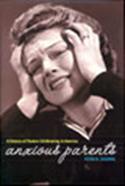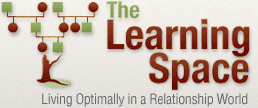The Learning Space Blog
Anxiety and Leadership

If it is the second Tuesday in January, then it must be the Leadership Coaching conference in Rochester, New York. Each year I travel north to a meeting led by John Engels, the founder and innovative thinker about leadership, who is both a respected colleague and friend.
This "new year tradition" serves the purposes of starting the year off well and providing a way to keep clients, colleagues and friends thinking. Again, this year we were treated to ideas about leadership but this time the focus was on leading as parents, not as business leaders.
The speaker, Dr.Peter Stearns from George Mason University, spoke on his book Anxious Parents and the historical events that has led to over-involved and constantly worried parents.
Anxious Parents: A History of Modern Childrearing in America
"The 19th and 20th centuries witnessed a dramatic shift in the role of children in American society and families. No longer necessary for labor, children became economic liabilities. At the same time, parents exhibited a new level of anxiety concerning the welfare of their children and their own ability to parent effectively. What caused this shift in the easy that parenting and childhood were experienced and perceived? Why, at a time of relative ease and prosperity, do parents continue to grapple with uncertainty and with unreasonable expectations of both themselves and their children.
Peter N. Stearns explores this phenomenon, examining the new forces that the 20th century brought to bear on families. Surveying popular media, "expert" childrearing manuals, and newspapers and journals published throughout the century, Stearns shows how schooling, physical and emotional vulnerability, and the rise of commercialism became primary concerns for parents. The results, Stearns shows, are that contemporary parents have come to believe that they are participating in a culture of neglect and diminishing standards. Anxious Parents: A History of Modern Childrearing in America shows the reasons for this belief and its consequences in terms of parental satisfaction through an historical analysis of modern parenting."
Anxiety is the hallmark of contemporary parenting. Today's parents are tormented by fears of Sudden Infant Death Syndrome, child abductions, and juvenile drug and alcohol use. In perhaps his most timely and exciting book, Peter N. Stearns explains with twit and humane insight how modern mothers and fathers came to agonize incessantly about children's personality development, school performance, and psychological well-being. Steven Mintz, University of Houston
A strong, effective, and readable portrayal of how 20th-century American parents have invested and over-invested in their children. In a fairly short compass, Stearns has demonstrated many of the things that historians have tended to belabor-the role of expertise; why despite their declining numbers, children have become so important socially; the new realm of consumption; and how the anxiety about children has become a central matter in 20th-century culture and even an identifier of American life. Stearns knows what is going on and that children are not a means to express other anxieties, but the very source of many of the anxieties we express. Paula Fass, University of California, Berkeley
His low key but factual approach of historical events that led to the "helicopter parent" was provocative.
Providing a historical background for a social phenomenon is intriguing to me, and the research approach that Dr. Sterns employs allows for the listener to question his or her own approach to parenting in a non-threatening way. He did what John hoped, he got me (and I believe the rest of us) thinking. I actively suggest the books that he has written.
Blog Categories
Blog Archive
- June 2019
- December 2018
- October 2018
- June 2017
- February 2017
- July 2016
- February 2016
- November 2015
- August 2015
- June 2015
- April 2015
- February 2015
- December 2014
- October 2014
- September 2014
- August 2014
- July 2014
- June 2014
- May 2014
- April 2014
- March 2014
- December 2013
- October 2013
- August 2013
- July 2013
- June 2013
- April 2013
- February 2013
- January 2013
- December 2012
- August 2012
- July 2012
- June 2012
- March 2012
- February 2012
- January 2012
- December 2011
- November 2011
- October 2011
- September 2011
- August 2011
- July 2011
- June 2011
- May 2011
- March 2011
- January 2011
- December 2010
- November 2010
- October 2010
- September 2010
- May 2010
About the Learning Space
"The Learning Space is a creative, energetic thinking space for individuals striving to live optimally in all their most important relationships. The Learning Space provides a conceptual space—a place to consider and experience alternate ways of relating."
Read More »
Upcoming Events
view events »Newsletter
Fill out the form below to subscribe to The Learning Space's quarterly newsletter, and get exclusive invitations to special learning forums and other events.

